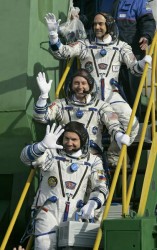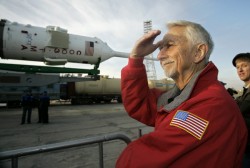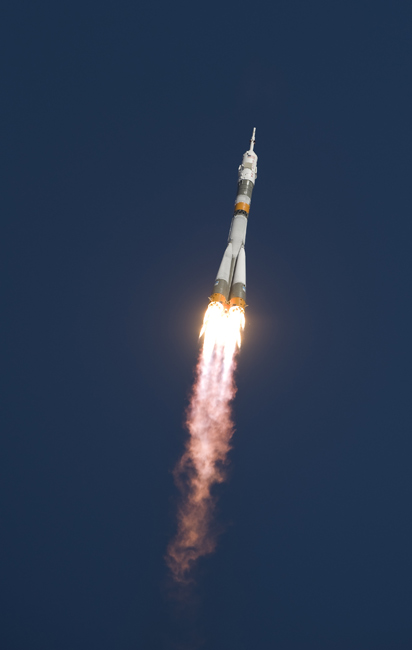[/caption]…but the station’s toilet has broken down again.
For $30 million, you can get a ride into space for a 10-day trip on board the International Space Station. To Richard Garriott, this is money well-spent. He got to spend months training for the experience and he will use the adventure to carry out experiments, educational programs and to follow in his father’s footsteps. 25-years earlier, Owen Garriott flew on Space Shuttle Columbia, and before that he served on Skylab. Having successfully launched on board the Soyuz launch vehicle on Sunday, Garriott Jr. is keen to make space travel a family affair, and make some history along the way; he is the first second-generation American astronaut ever to be launched into space. It sounds like an exciting few days await the 47 year old computer video game entrepreneur…
But like any positive story, there’s a flip-side. The International Space Station, far from being The Ritz at the best of times, has been inflicted with a rather annoying inconvenience… the main toilet is out of order, requiring all on board to use the Soyuz en-suite. Although it is doubtful Garriott will get a room credit for the inconvenience, I’m sure the view of the Earth rotating below, the excitement of being involved in the biggest space project ever conceived, and the joy of zero-G will more than make up for the bathroom situation…
At 3:01 AM EDT (0701 GMT) Sunday morning, Richard Garriott blasted off from the Central Asian spaceport of Baikonur Cosmodrome in Kazakhstan aboard a Soyuz TMA-13 spacecraft. Expedition 18 is being used to ferry two new crewmembers to the ISS. American astronaut Michael Fincke and Russian cosmonaut Yury Lonchakov will keep Garriott company until tomorrow’s (Tuesday) Soyuz docking with the station where the trio will join the existing ISS crewmembers Commander Sergei Volkov, Flight Engineer Oleg Kononenko and astronaut Gregory E. Chamitoff. Volkov and Kononenko will accompany Garriott when he is scheduled to return back to Earth on October 23rd.

“Today, my dream of following in my father’s footsteps to explore new frontiers is being realized,” Garriott said in a statement shortly after launch in reference to his father, 77 year-old retired NASA scientist-astronaut Owen Garriott. “It’s with honour and appreciation that I launch on my greatest adventure yet, and step into a role assumed by only five private individuals before me.”
Watching his son being launched into orbit, Garriott Sr. supports Richard in all his space-faring dreams. “He wants to charge full speed ahead,” said Owen, who flew to the pioneering Sklab space station in 1973 and flew on shuttle Columbia 10 years later.
Richard Garriott has been preparing for this moment for many months, and his excitement is evident in the post on his website before launch. “I feel well prepared for this flight, and have complete faith in my crew mates, our beautiful rocket, and the huge number of people it takes to launch our Soyuz and operate the ISS,” Garriott said, wanting his friends and family to be there with him. “I wish I could share this experience with each of you, in the way I have had the opportunity to experience it.”

Unfortunately, there will be some uncomfortable days aboard the ISS. On Thursday, the main toilet facility broke down in the Russian Zvezda service module, leaving the crew to use the Soyuz bathroom facilities. The main toilet has been the source of much hassle to the crew and flight controllers; back in June Oleg Kononenko had to carry out a lengthy in-orbit plumbing job to get the gas-liquid separator assembly pump replacement up and running. It would appear a similar problem has struck again, only three months later. Perhaps the crew should ask Kononenko to use his skills once more before the cosmonaut has to return back to Earth with Garriott on October 23rd…
For now, plumbing issues to one side, we look forward to seeing Richard Garriott, the sixth space station tourist, carry out his experiments and observations, relaying all his experiences to the rest of the world who cannot afford the $30 million ticket.
“I will return to our earth in a few weeks, with a vast array of photographs, and a lifetime of new stories,” Garriott wrote in his website message. “I look forward to sharing them with you!”


When Garriot gets up there, he’ll ask each ISS member
NAME?
JOB?
BYE
(Sorry, Ultima joke. :D)
I didn’t expect anything else.
The International Space Station will be remembered with its constant problems, not scientific achievements. Both professor Steven Weinberg and Robert Park said it right – a techno turkey.
These days MESSENGER flied by Mercury and sent a lot of interesting new images. Phoenix detected that there’s snow on Mars. Using Kaguya data we know new things about gravity anomalies on the Moon. All these projects will be remembered as successful and worthy to science.
When does the International Space Station appear in the press? Only when something is breaking down – the toilet, the SARJ, the computers. This year they took the Columbus and Kibo modules. Where is the science promised?
By the way I still expects something great to be discovered aboard ISS until its deorbiting, but my faith constantly fades away.
Well, I personally think the most important scientific contribution of the ISS is the ISS itself.
The fact is that as we plunge deeper into space, at each step we’ll be faced with new challenges and situations we have to overcome. The sheer level of complexity of the ISS is unprecedented, and we need to learn how to deal with the problems generated by such a structure, if we want to have any hope to build permanent habitats in orbit (Earth’s or otherwise) or in other worlds. The ISS is a step in that road. That it is reveiling to be a problematic step is at the same time a curse and a blessing, but it should have been expected.
A curse because it curbs the enthusiasm of the optimists out there, who often seem to think that going to and living in space is, or should be, a walk in the park. It isn’t. In fact it’s something extremely difficult to do. Every problem that hits the ISS is one more delay in going forward because it’s one more problem for which a solution has to be found. But this brings us to the blessing part of the deal:
We learn when we’re hit by problems, by the unexpected. The more problems we find in building and operating the ISS, the best prepared we’ll be for the next step. And that is invaluable.
The biggest error that was made around the ISS was in how it was presented to the public. The ISS should never have been presented as an end in itself, as a place to make all sorts of discoveries dealing with anything other than the constant presence of people in Earth’s orbit. Perhaps that was necessary to guarantee public support to a very expensive endeavour, perhaps presenting it as a step to something even more complex and hard to do would not have worked, but the fact is that it is now generating frustration in all those that actually believed in the scientific wonders the ISS would bring. That’s the problem with propaganda: when reality settles in, people feel defrauded.
I don’t expect from the ISS anything other than to be a place where the challenges of life and construction in orbit are put to a real-life test. We’ll never have larger stations up there, or even factories, without this second (or third, if we count the Skylab… I usually don’t) step, much the same way we’d never have the ISS without the work done in the Mir station.
Jorge: I’d like to ask you one question. Why do we need to make outposts, habitats and so on?
I usually get two answers. The first one is that space exploration is needed for human survival. Oh, come on, we know that it’s impossible to build such a big space habitat with existing technology. ISS is the biggest thing and it breaks constantly. Shuttle launches are so expensive and all these delays worsen the situation – look at Hubble, for example.
Human Survival? Maybe. But not now. Is the ISS a stepping stone to this? Probably… Anyway, programs like the shuttle and ISS stretched out into decades. It’s impossible to keep the public interested for a long time.
The second answer I get is that ISS is needed for future deep space missions. However we don’t need a station to send people to the moon – Apollo 11 flew before the first Salyut was launched. As for Mars – such a project will cost thousands of billions dollars and it seems unlikely that any human will travel to there until 2050.
Also, all of the deep space exploration is carried out by robots.
Lets not spoil the party kids. If you’re not here for the thrill the excitement and wonder of it all take your downer Debbie cupcakes next door.
Ya’ll just hatin cause this dude gets to ride atop a rocket and hang with all the peeps chillin at the ISS and your stuck down here. Don’t hate congratulate.
I’m with you Jorge, we have people constantly in orbit because we can. And if we could, it wouldn’t be robotic space craft out there having all the fun.
Let’s support these people children.
I am a fan of Garriott and Ultima, but he is a tourist not an astronaut.
If one were to argue, he is at most a cosmonaut since he went to space in a Russian rocket. 😛
Regardless, being an astronaut is a career and I don’t think it is fair to allow a rich tourist into their club.
Svetoslav, my answer is the first one.
You think our technology is still not ripe for it? True. But it won’t become ripe unless we do what we can with the tech we have in any given moment. We learn to do things better by actually doing them and making mistakes, thus identifying flaws and finding better solutions. It’s true that we still can’t build an off-world outpost, we just don’t know enough for that. But just waiting for the “right moment” won’t get us there.
Let’s hope they actually *save* the data this time, unlike a certain appollo program’s lost documents, reels and pictures…
I can’t believe they still need to look at 40 years old heatshields to make new ones it’s unbelievable.
Just ask the russians! In fact Orion should have been outsourced to russia, it’d already be up and afloat if you ask me. Talk about re-inventing the wheel geessh!
And i’m sure it’ll end up the same way for the 150billions ISS.
Sorry but i’m just bitter today. At least this guy will have cleverly made use of his cash instead of investing it (and loosing most of it) in crooky wall street….
😉
He will not be on vacation but will do some student experiments and will collaborate in other experiments for NASA. So it’s not useless and he’s not really a “tourist” or ther crap we can read here.
This is why mom always tells you to “Go before you Leave” on a trip.
Svetoslav Alexandrov, i dont know where do you live but can you me a mor agressive commentary about inmense, mounstrous budgets that EUA and ALL “developed” countries spend?
Can you investigate the figures, surely you will find the economic efford towards space in general, microscopic compared to WAR related topics.
!!! Wake up man ¡¡¡¡
I can remember hearing all manner of opinion as to whether we SHOULD put an object into space, let alone a human (late 1940’s – early ’50’s). Of course the general consensus was that it would be a waste. Better spend the money on earth – blah blah. We have robots exploring the frontier now, but the TRULY ADVENTUROUS people will always want to go out into the frontier. Hundreds of years from now it’ll be the same old song – why send humans on interstellar voyages. Better spend the money at home in the solar system. We don’t need the ‘economic benefit’ song and dance the stay-at-homers need. Robots are fine, but the real thrill is the experience – that can only be felt by us humans. For the nay-sayers, remember – mommy was right. It’s a dangerous Universe. Don’t take a chance and get hurt. Stay at home. Play Pong.
Svetoslav Alexandrov, what are you afraid of? Only fear makes people sceptical and mistrustful. Relax and try to enjoy in such an enormous and fascinating adventure. I can only immagine what you would have commented on Cr. Columbus or Magellan journeys if you had lived then
It still baffles me why people cannot see the sense in putting people in orbit.
To me there is more sense in the ISS than in the Mars Rovers. Once we have an established orbital population there will be an almost singular jump in exploration. To manufacture anything on earth will seem stupid. In orbit you have all the energy you need to smelt metals, manufacture rockets. you have all the resources you need from the moon and astroids and all of this costs far less energy than getting even a small satellite into orbit.
As Jerry Pournelle has said in numerous places, half the energy you need to go anywhere in the universe, you are going to spend getting out of earth’s gravity well.
Look at the size of the rockets used to get into orbit vs the size of the rocket to get from orbit to mars or the moon. Deep space used an ion drive. An asthmatic parrot can blow with more force than an ion drive.
But the toilet… How can managing human excrement be such a challenge. Why don’t they just microwave it till its dry and vacuum it up. Even a 5 year old knows that dry doggie-do doesn’t smell. Condense the steam and run it through the water purifier if you are worried about h20 loss. 😛
—I can only immagine what you would have commented on Cr. Columbus or Magellan journeys if you had lived then—
Of course, Columbus didn’t sail endlessly to an artificial island 100 kilometers from the seashore. Remember – space is called so for a reason. It means nothing – an empty void. The interesting objects are far away – and we haven’t been there for almost 40 years.
To Svetoslav Alexandrov:
I’d just like to say that Jorge and Jeremy C have said and explained everything that you should know and understand, so I won’t repeat it all. Read carefully and maybe eventually you’ll be able to see the evident.
They should send Joe the plumber up there to fix the toilet.